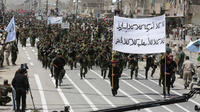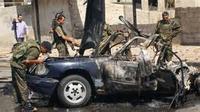-
California builds a sophisticated Emergency Response Training Center
Citing the need for further emergency training, some Sacramento County officials have proposed a plan to construct a $56 million training facility for Californian emergency responders which would handle all types of training and scenarios.
-
-
“Independent” Kurds need Baghdad more than they’d like
Iraqi Kurds are in a unique position to declare independence in defiance of a seemingly powerless central government in Baghdad following the rapid disintegration of Iraq in the face of the Islamic State in Iraq and As-Sham (ISIS) onslaught. But is independence as simple as that, a fait accompli resulting from a series of unpredictable events? Unpalatable as it may sound to Iraqi Kurds, the KRG needs Baghdad far more than it is prepared to admit. By all means, the Kurdish Regional Government (KRG) should seek to leverage a better deal out of Baghdad — the Kurdish armed forces, or peshmerga, are vital to the fight against ISIS. In terms of full independence, though, the costs seem to outweigh the benefits at present.
-
-
More Westerners join ISIS following the group’s successes in Iraq

Of the 10,000 foreign fighters who have already joined militant groups in Syria and Iraq, 3,000 hold European or other Western passports, making it easy for them to travel across most borders. U.S. officials report that as many as 100 foreign fighters hold U.S. passports, leading to worries that foreign fighters may return to the United States to launch an attack.
-
-
U.S. mulls ways to handle complex child immigration issue
The influx of unaccompanied children crossing into the United States has reached crisis proportions, with 90,000 now in the United States. The children are escaping violence and deprivation in Honduras, Guatemala, and El Salvador, but a George W. Bush-era law prevents their rapid repatriation. Leading Republicans want to change the law, but many Democrats condition such a change on folding it into a comprehensive immigration reform.
-
-
Plans for nationwide 911 dispatch centers advance
Municipalities across the country are planning to connect 911 dispatch centers in an effort to improve information sharing. Plan is to connect dispatchers via the Internet, which will allow centers quickly to transfer calls, 911 text messages, photos, videos of accident scenes, and other information. The technology is part of a “Next Generation 911” initiative already being implemented across the country.
-
-
9/11 Commission: U.S. faces new and dangerous terrorist threat
The members of the 9/11 Commission, led by Chairman Tom Kean and Vice Chairman Lee Hamilton, released a new report the other day to reflect what they describe as the altered but dangerous terrorist threat facing the United States. Members of the commission say that ten years after the release of the commission’s original report, with increasing threats from the resurgence and transformation of al Qaeda, Syria, and a rapidly changing cyberspace, the commission’s new report calls for a vigorous and proactive counterterrorism effort.
-
-
Israel destroys al-Wafa hospital in Gaza City; cabinet considering expansion of Gaza operations

One of the first targets on the first day of the current round of war between Israel and Hamas was al-Wafa hospital in eastern Gaza City. As is the case with other hospitals in Gaza, Hamas used the facility to store rockets and other arms and shelter Hamas fighters, who also use the hospitals’ upper floors for snipers to shoot at IDF soldiers and for rocket launching – some witnessed by a Financial Times reporter. In the case of al-Wafa, the hospital also served Hamas as a command-and-control center. Yesterday (Wednesday), Israel decided that enough was enough, and that allowing Hamas fighters the freedom to operate behind the patients and staff at the hospital, located in central Gaza City, posed too much of a risk for Israeli forces, and Israel Air Force (IAF) planes finished the destruction of the hospital — after the staff heeded IDF warnings and vacated the facility with the remaining patients. A series of powerful secondary explosions proved that the hospital served Hamas for arms storage. The Israeli cabinet is meeting this morning to consider the expansion of the ground war.
-
-
U.K. launches inquiry into radiation poisoning of former KGB agent
British authorities have announced that a public inquiry will be held into the death of former Russian KGB officer who became a British citizen, Alexander Litvinenko.Litvinenko, 43, died in 2006 after he was poisoned with radioactive polonium while drinking tea with two former KGB agents at a London hotel.
-
-
Effectiveness of Texas National Guard border troop surge questioned
Texas governor Rick Perry’s plan to send nearly 1,000 Texas National Guardtroops to the Rio Grande Valley has been applauded by the governor’s supporters, but critics question its effectiveness. Gov. Perry’s decision to send nearly 1,000 guardsmen to the Rio Grande Valley is described as “symbolic,” and top officials in border counties agree that sending more guardsmen to the border would bring little change to the current situation.
-
-
Wave of illegal children immigrants shifts debate on use of executive powers

After several immigration bills stalled in Congress, President Barack Obama, in 2012 and 2013, issued a series of executive orders to limit the number of deportations of illegal immigrants. Many who advocated a tougher stance on immigration have charged Obama with failure to consult with Congress. The Obama administration is now trying to find a way to deport Central American illegal immigrants, many of them unaccompanied children, without running afoul of a George W. Bush 2008 law which makes such deportation difficult – and some of his immigration criticswant him to take executive action on the issue, a shift from their usual criticism that he has abused his executive powers.
-
-
Azamat Tazhayakov, Dzhokhar Tsarnaev’s friend, guilty of conspiracy charges
Azamat Tazhayakov, who removed a backpack from the dorm room of Boston bombing suspect Dzhokhar Tsarnaev, has been found guilty by a Boston jury of impeding an investigation and conspiracy. Tazhayakov was one of three college friends of Tsarnaev charged following the bombing. Tazhayakov could face up to five years in jail and a fine of $250,000.
-
-
The number of labs handling deadly germs grows, and so do calls for regulating lab safety
The number of labs handling dangerous pathogens continues to grow, and so does the number of accidents involving dangerous pathogens. The number of reported accidents involving dangerous microbes grew rapidly from just sixteen in 2004 to 128 in 2008, and 269 in 2010, the last year reported.Experts note that currently there is no single federal agency responsible for assessing overall laboratory needs — instead, departments and agencies only assess the needs for labs relative to their respective missions.
-
-
NYC forms a task force to coordinate accommodation for migrant children
New York City officials have formed a task force to help coordinate accommodation for Central American children who have arrived in the city in recent months after weeks and months of living under the care of immigration and border officials near the Southwest border. Since October 2013, federal officials have sent more than 3,200 children to New York City and elsewhere in the state to live with relatives or guardians, and about 7,000 more are expected to arrive in the coming months, according to officials who have been briefed by federal authorities.
-
-
FBI: driverless cars could be used as bombs-on-wheels

Whether or not a driverless car, from Google or any other company, ever makes it to market, the FBI thinks it may be a “game changing” vehicle which could dramatically change high-speed car chases so that the pursued vehicle would have an advantage over the pursuing car. An agency report also warned that such cars may be used as “lethal weapons.”
-
-
After eight years under siege, Hamas is fighting to stave off a slow death

Hamas and Egypt are currently testing each other’s nerve. Hamas wants to engage the Egyptian government and press the point that they have nothing to do with the Islamist insurgency there, in an effort to get the border crossings open and re-engage with the new al-Sissi administration. But regardless of whether this round of conflict is resolved sooner rather than later, or whether Egypt softens its stance on Hamas, the fundamental challenge facing both Palestinians and Israelis remains the same: to reach a political settlement for a viable Palestinian state where both Palestinians and Israelis can live in peace and security.
-
More headlines
The long view
Kinetic Operations Bring Authoritarian Violence to Democratic Streets
Foreign interference in democracies has a multifaceted toolkit. In addition to information manipulation, the tactical tools authoritarian actors use to undermine democracy include cyber operations, economic coercion, malign finance, and civil society subversion.
Patriots’ Day: How Far-Right Groups Hijack History and Patriotic Symbols to Advance Their Cause, According to an Expert on Extremism
Extremist groups have attempted to change the meaning of freedom and liberty embedded in Patriots’ Day — a commemoration of the battles of Lexington and Concord – to serve their far-right rhetoric, recruitment, and radicalization. Understanding how patriotic symbols can be exploited offers important insights into how historical narratives may be manipulated, potentially leading to harmful consequences in American society.
Trump Aims to Shut Down State Climate Policies
President Donald Trump has launched an all-out legal attack on states’ authority to set climate change policy. Climate-focused state leaders say his administration has no legal basis to unravel their efforts.
Vaccine Integrity Project Says New FDA Rules on COVID-19 Vaccines Show Lack of Consensus, Clarity
Sidestepping both the FDA’s own Vaccines and Related Biological Products Advisory Committee and the CDC’s Advisory Committee on Immunization Practices (ACIP), two Trump-appointed FDA leaders penned an opinion piece in the New England Journal of Medicine to announce new, more restrictive, COVID-19 vaccine recommendations. Critics say that not seeking broad input into the new policy, which would help FDA to understand its implications, feasibility, and the potential for unintended consequences, amounts to policy by proclamation.
Twenty-One Things That Are True in Los Angeles
To understand the dangers inherent in deploying the California National Guard – over the strenuous objections of the California governor – and active-duty Marines to deal with anti-ICE protesters, we should remind ourselves of a few elementary truths, writes Benjamin Wittes. Among these truths: “Not all lawful exercises of authority are wise, prudent, or smart”; “Not all crimes require a federal response”; “Avoiding tragic and unnecessary confrontations is generally desirable”; and “It is thus unwise, imprudent, and stupid to take actions for performative reasons that one might reasonably anticipate would increase the risks of such confrontations.”
Luigi Mangione and the Making of a ‘Terrorist’
Discretion is crucial to the American tradition of criminal law, Jacob Ware and Ania Zolyniak write, noting that “lawmakers enact broader statutes to empower prosecutors to pursue justice while entrusting that they will stay within the confines of their authority and screen out the inevitable “absurd” cases that may arise.” Discretion is also vital to maintaining the legitimacy of the legal system. In the prosecution’s case against Luigi Mangione, they charge, “That discretion was abused.”
